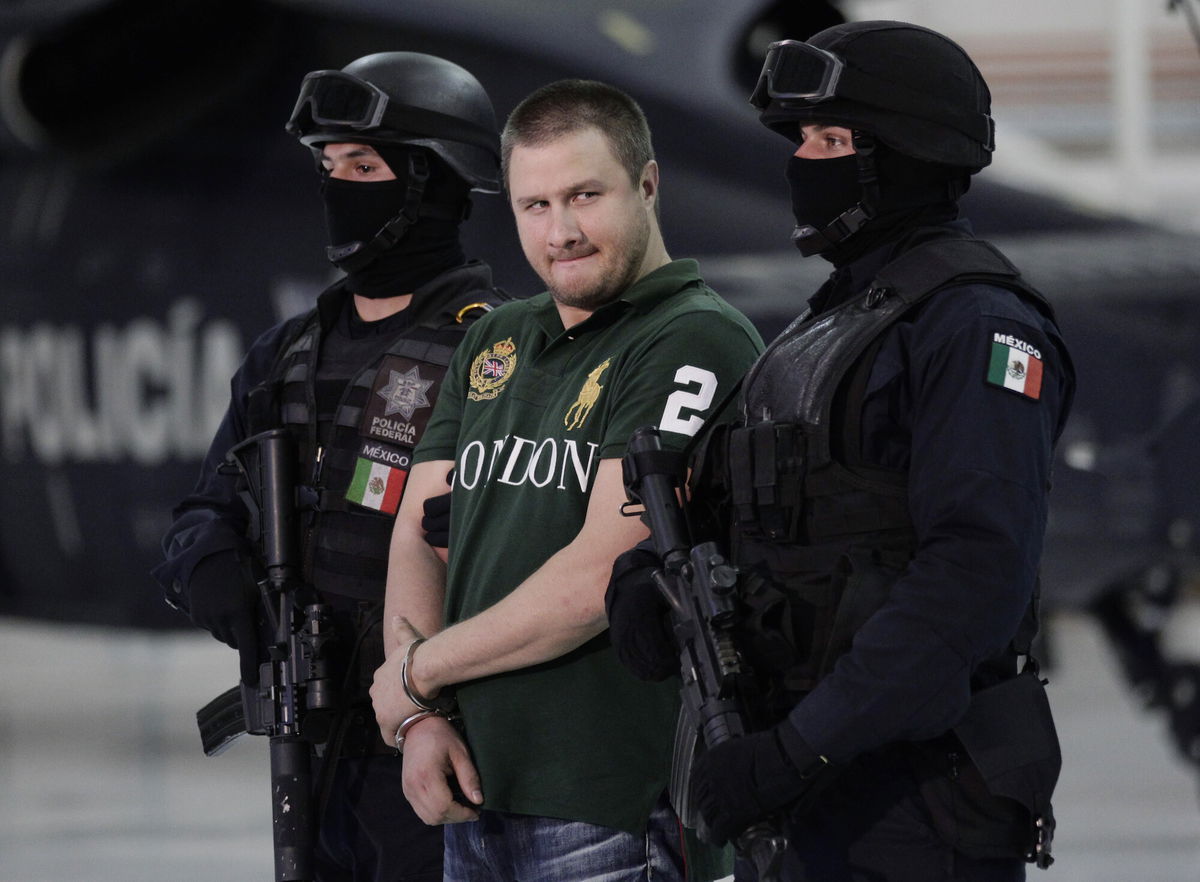Drug lord ‘La Barbie’ is not currently in federal custody, Bureau of Prisons says

Edgar "La Barbie" Valdez Villareal is escorted by Mexican federal police during a news conference at the federal police center in Mexico City in August 2010. According to the Federal Bureau of Prisons
By Florencia Trucco, CNN
Mexican-American drug trafficker Edgar Valdez Villareal, alias “La Barbie,” is “not currently in federal custody” in the United States, the Federal Bureau of Prisons told CNN.
Valdez Villarreal’s name appears as “not in BOP custody” on the agency’s website, CNN confirmed Tuesday. When asked why, bureau spokesperson Benjamin O’Cone declined to give more details and explained there are “several reasons” why this can happen.
“Inmates who were previously in BOP custody and who have not completed their sentence may be outside BOP custody for a period of time for court hearings, medical treatment or for other reasons,” O’Cone said in an email Tuesday. He added that they do not provide specific information on the status of inmates who are not in the custody of the Bureau of Prisons for “safety, security, or privacy reasons.”
Valdez Villareal, a Texan who ascended the ranks of one of Mexico’s most ruthless drug cartels, was sentenced in June 2018 to 49 years and one month in prison and fined $192,000.
He pleaded guilty in January 2016 to conspiracy to import cocaine, conspiracy to distribute cocaine and conspiracy to launder money.
The 49-year federal prison term meant Valdez Villareal, who was 44 at the time of sentencing, would likely spend the rest of his life incarcerated. If he were still alive at the end of his sentence, he would serve 10 years of probation, the Justice Department said at the time.
Mexican President Andrés Manuel López Obrador, in his daily news conference Tuesday, said his only information about Valdez Villareal was from the media.
The president said both the Foreign Relations and Security Secretariats are requesting information to find out about the drug trafficker’s whereabouts.
“If he is not in prison, you have to see the agreement they made with him because his sentence was for several years. Here in Mexico, there are also complaints filed against him,” López Obrador said. “Do not get ahead of ourselves. We are going to wait to see what is happening.”
CNN has reached out to the US Department of Justice and the US Attorney’s Office for the Northern District of Georgia about Valdez Villareal’s whereabouts.
The lawyer who represented Valdez Villareal during his trial in Atlanta, Wilmer “Buddy” Parker, told CNN he did not know about a possible release and said he had no further comment.
‘Top-level enforcer for the cartel’
Over the course of two decades, Valdez Villareal trafficked marijuana before developing a network by which he was regularly shipping between 150 and 180 kilograms of cocaine into multiple US cities, then-US Attorney Byung Pak said.
After connecting with Arturo Beltran Leyva and later Joaquin Guzman-Loera, aka El Chapo, Valdez Villareal began using speedboats to transport cocaine from Colombia and other South American countries into Mexico and then on to the United States, Pak said.
At one point, Valdez-Villareal was El Chapo’s top lieutenant, prosecutors said. Mexican Marines killed Beltran Leyva in a 2009 shootout.
In 2004, the Justice Department says, he began shipping cocaine from Mexico into Atlanta and Memphis on the back of tractor trailers. Twice a week, he’d run 300 kilograms (661 pounds) to his customers and ferry the money back across the Mexican border. In six months of 2005, he shipped 1,500 kilograms (3,307 pounds) into Atlanta alone without ever stepping foot in the city, prosecutors said.
“At the same time, Valdez-Villareal became a top-level enforcer for the cartel and coordinated a war against his rivals, the Gulf Cartel and Zetas in Mexico,” the Justice Department news release said.
Valdez-Villareal made his name in the drug underworld as a hitman, authorities say. In the mid-2000s, the Zetas and the Sinaloa cartel fought a long and bloody turf war for Nuevo Laredo smuggling routes, and Valdez was a key soldier in the battles.
It was a high school football coach who reportedly gave Valdez Villareal the nickname of “La Barbie” because of his blue eyes and light complexion.
The-CNN-Wire
™ & © 2022 Cable News Network, Inc., a Warner Bros. Discovery Company. All rights reserved.
CNN’s Gustavo Valdes and Eliott C. McLaughlin contributed to this report.
